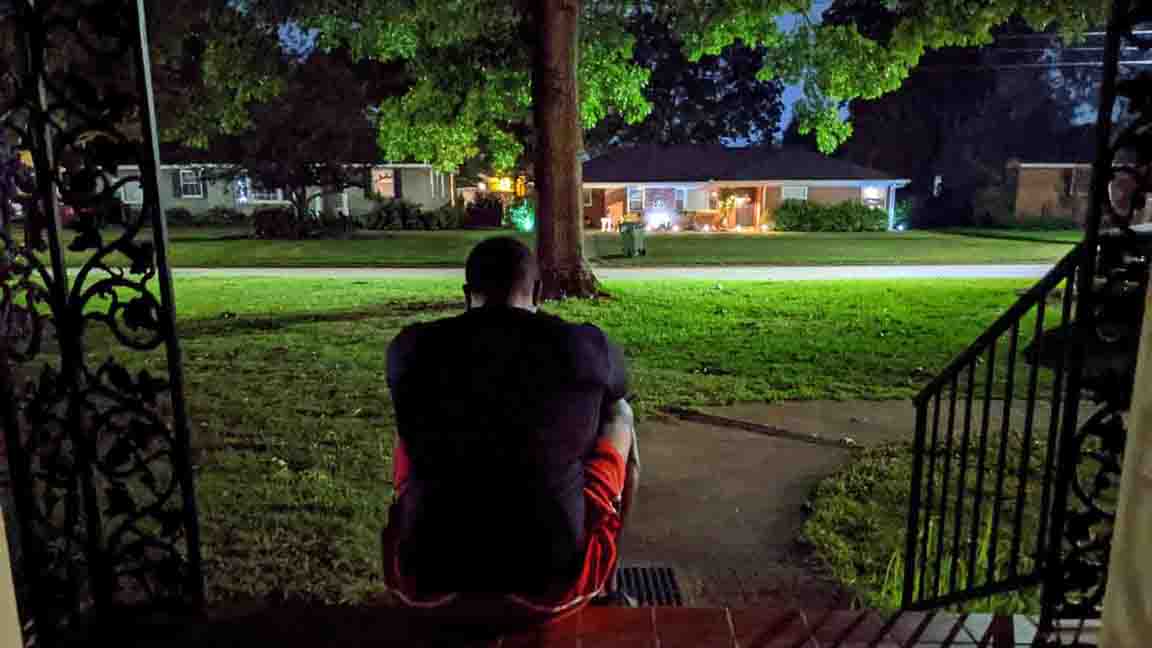
IN THE SLEEPLESSNESS of the late nights, Joe Vaughn, 40, leaves his sleeping wife and heads outside, where he immerses himself in something he calls “my own enlightenment”—a kind of life review, he says. Here, he tries to figure out how to escape the matrix of his life as a Black man, a life in which he feels he is constantly struggling to make progress.
A physical education teacher with the Montgomery Public Schools, Vaughn is the father of three children. The family lives in a four-bedroom house, a rental in a working-class neighborhood.
People tell Vaughn that he has come so far, overcome so much. And that is true. But Vaughn’s focus is on the future, which with his hard-earned logic, inevitably brings him to thoughts of death.
His own death. The people he watched die violent deaths throughout his childhood. His brother’s murder three years ago.
“He was out on the front porch cleaning his refrigerator when someone shot him,” Vaughn said. “That broke me.”
These are the thoughts that keep Vaughn up at night. Vaughn’s parents both struggled with substance abuse, he says, and as one of six siblings, he grew up in a housing project where he was faced with drugs and violence and prostitution. His mother had been sexually assaulted when she was a child and never received the emotional support she needed to break free from that trauma, he says. Then she was exposed to drugs. His father, Vaughn says, was never a permanent part of the picture. At 5, Vaughn went to live with his maternal grandmother, in the Trenholm Court housing projects of Montgomery. At 8, Vaughn was nearly killed by a young man who used a broken bottle to cut him on the neck, less than a centimeter away from a major artery.
“I didn’t think I would live to be 40,” Vaughn said, matter of factly.
Vaughn says he followed the rules people told him to follow—he stayed in school, he got decent grades and played sports—but his main motivators were that he did not want to die and he did not want to spend his life in prison.
Now Vaughn wants to overcome the systematic barriers that keep him and so many Black people he knows from thriving: the knowledge of how to attain good credit; the financial leverage to secure a decent bank loan; the knowledge of how, when the time comes, to help his children do the same.
“My son asked me a couple of years ago: ‘Do we have a college fund set up for me?’” Vaughn said. “I told him, ‘No son, but I am doing the best I can.’ ”
That exchange continues to keep Vaughn awake at night.
“I feel if I die, I want to have an inheritance to leave behind. I wasn’t put here on this earth to say ‘I overcame drugs.’”
In addition to his job as a teacher, Vaughn is also the founder of Underdog Consultants, a company through which he aspires to help youths lead their best possible lives. He carries the company’s program, “Aspire DREAM BIG,” to audiences and groups that invite him to speak.
“I want to move thousands of people forward like I have seen W.E.B. Du Bois, Malcolm X, Dr. Martin Luther King, and Dr. Eric Thomas. Then I will know that I have succeeded. That is something that causes me not to sleep. Because that is the thing about death. You have to stay ahead of it.”
Vaughn has gotten life insurance, he says. But he doesn’t own any property, he points out, and that’s another fact that keeps him awake.
He worked for years to clean up credit problems after his mother used his personal information to get her electric service and then did not pay the bill. “My mom was not given opportunities. Because she was not given opportunities, she robbed me of opportunities,” Vaughn said.
Despite his solidity and steady employment—Vaughn has been with the Montgomery schools for 16 years—the banks continue to deny him low-interest credit and low-interest loans, he says.
“I don’t have the generational foundation to break out of the rat race,” Vaughn said.
There is a huge tree outside his home, Vaughn says, a tree he has dubbed “the limbs of life.” During the sleepless nights, Vaughn stares at that tree, thinking about how, after four decades of life, he is only beginning to learn things that could have moved him and his family forward if he had known about them earlier. One of his most recent findings, for example: that it is possible to assist your child in building credit by adding them to a parent’s credit card.
“A white lady at the bank told me that. I was like, ‘You can do that?’ ”
In addition to taking classes on intergenerational wealth, Vaughn says he is just beginning to learn who he is—beyond what his own elementary school teachers taught him about how he comes from a lineage of slaves.
“I felt for so long like I wasn’t anybody. Now I feel so inept culturally—like, as a Black person I don’t really know who I am,” Vaughn said. “I had not heard about the Tulsa riot or the Black Wall Street until two or three years ago. I was blown away. There are so many Black pioneers.
“And here is the thing: If I don’t have a cultural identity and I don’t know who I am, I am going to go forth in the world with blinders on. This is the kind of thing that keeps me up at night.”
“How Did You Sleep Last Night?” is an ongoing series.
